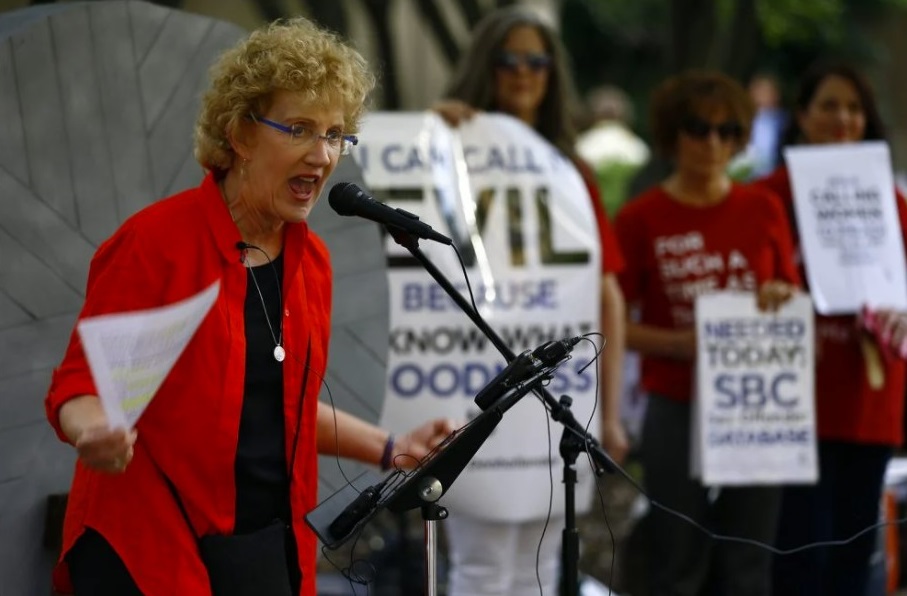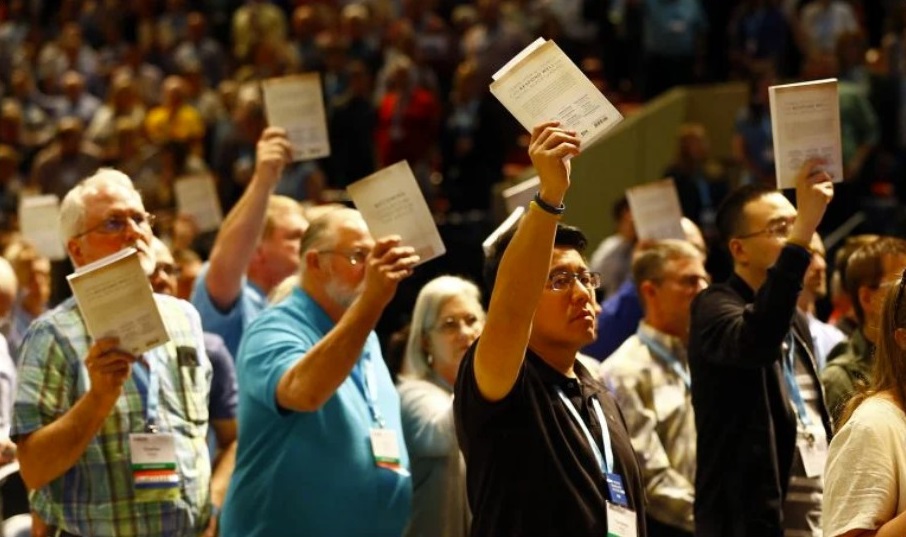NASHVILLE (TN)
Religion News Service - Missouri School of Journalism [Columbia MO]
May 20, 2021
By Christa Brown
Few abuse survivors anticipate the country’s largest Protestant faith group will effectively address its sexual abuse problem without the pressure of outside forces.
As the Southern Baptist Convention prepares for its annual gathering next month in Nashville, Tennessee, expectations that clergy sex abuse survivors will see meaningful progress are low. Few of us anticipate the country’s largest Protestant faith group will effectively address its sexual abuse problem.
Over two years have passed since the “Abuse of Faith” investigatory series brought wide media attention to the long-standing, pervasive SBC problem of clergy sex abuse and church cover-ups. The series documented more than 700 people who reported having been sexually abused by Southern Baptist clergy and church leaders. Nearly all were children at the time they were abused.
The investigation also found that the very structure of the SBC “enabled predators to move undetected and stifled reforms to prevent abuse.” And the investigation implicated past SBC presidents and prominent Southern Baptist leaders in the mishandling of abuse complaints.
Faced with such devastating findings, you might imagine a responsible institution would do everything in its power to try to ascertain the scope of the problem, effectively address it and reach out to other survivors. But that hasn’t happened; the SBC’s response has been anemic.
Rather than adopting advocates’ proposal for a database of credibly accused clergy abusers, the SBC trotted out a Credentials Committee process, which many decried as unsafe and ineffective, appearing as more of an institutional image-repair tactic than an earnest effort to hold clergy abusers and enablers accountable. “It is essentially impotent,” said prominent victim advocate Rachael Denhollander.

This process has resulted in a total of three small churches being disfellowshipped for having allowed known sex offenders in the pulpit. In the face of a pervasive problem, this isn’t progress; it’s performative.
And make no mistake: “SBC leaders have long been aware of the problem,” as the “Abuse of Faith” report noted. It was 15 years ago when I, along with other members of the Survivors Network of those Abused by Priests, first proposed reforms to SBC officials, including the proposal for an independent review board and record keeping on credibly accused clergy.
Then came an ABC “20/20” exposé that documented church-hopping SBC “preacher-predators.” And then The Associated Press uncovered insurance company data showing that Protestants, including Baptists, likely had as big a clergy abuse problem as Catholics. None of this was enough to prod a robust response; nor were the stories of hundreds of survivors.
Instead we have seen the SBC pattern repeat itself again and again: lots of talk followed by institutional inertia.

Consider the example of Russell Moore. As president of the SBC’s Ethics & Religious Liberty Commission, he spoke out against abuse, but institutionally, there has still been little change, and now Moore himself has announced his departure from SBC leadership. This illustrates how, in a system lacking effective structures for accountability, even well-intentioned people will find themselves unable to effect change within that system.
This is why secular authorities must intervene. The Southern Baptist Convention has repeatedly demonstrated it will not take meaningful action to expose clergy predators, to rectify harm to survivors or even to assess the scope of the problem. In a faith group with 14.5 million members, this is a recalcitrance that carries a heavy cost in lives decimated by clergy sex abuse and religious institutional betrayal.
So, a Truth and Justice Commission is needed. The resources of the federal government should be brought to bear to comprehensively investigate sexual abuse, indifferent responses and institutional enablement in the Southern Baptist Convention. Such a commission could hear testimony from all who can bring forth information about abuse committed by any pastor, minister, deacon or church staff member — current or past; paid, interim or volunteer — of any SBC-affiliated church or entity. And over time, it could provide a fuller picture of the complicity of other leaders and of institutional structures.
There is ample precedent for such a commission. Australia’s Royal Commission on Institutional Responses to Child Sex Abuse could serve as a model, as could the U.S. Justice Department’s investigatory probe of Catholic dioceses in Pennsylvania. In addition, 22 states have conducted or begun investigations of sexual abuse by Catholic priests, and these could provide an alternative model for multiple such commissions at the state level.
And what would an independent commission taking thousands of testimonies be likely to uncover?
Shortly after “Abuse of Faith” was published, Southern Baptist Convention President J.D. Greear acknowledged that the 700 documented victims accounted for “only a fraction of the actual amount of abuse that occurs in SBC churches.” This is consistent with what we advocates know as well: 700 is the tip of the iceberg.
A Truth and Justice Commission could assess the dimensions of that iceberg — of what remains still hidden below the waterline. Countless victims’ stories were never documented and so were not included in the “Abuse of Faith” investigation. Many others fell outside the series’ 20-year investigative window. And while “Abuse of Faith” relied heavily on documentation from criminal prosecutions, experts affirm the vast majority of sexual assaults and child molestations are never criminally prosecuted.
In other faith groups, we have been able to gain a better understanding of the scale of clergy abuse because of ecclesiastical processes for assessing and documenting clergy who are credibly accused but not criminally convicted; however, this sort of documentation is absent in the SBC.
To give you an idea of how many more predatory pastors might be revealed if credible allegations were documented, consider for example that an investigation by the Colorado attorney general uncovered 52 credibly accused priests, none of whom could be criminally prosecuted. This illustrates why the SBC’s failure to document credible allegations is such a serious safety gap. A faith group that relies primarily on criminal prosecutions to expose clergy predators is one in which most predators will remain undetected.
Further insight into the likely horrific size of the SBC’s abuse iceberg can be gleaned from two studies. One study indicated 70% of Southern Baptist ministers have known of other ministers who have engaged in “sexual misconduct” with a congregant. The SBC has roughly 100,000 clergy in affiliated churches; so this means about 70,000 ministers know of a colleague whose conduct should rightly be characterized as abusive.
In another study, 4% of Protestant churchgoers reported they know of someone attending their church who has sexually assaulted someone without it coming to light. The 2019 average weekly worship service attendance in SBC churches was 5,250,230. Calculating 4% of this number yields about 210,000 Southern Baptist churchgoers who may know of someone in their church who has sexually assaulted someone.
A Truth and Justice Commission could provide a path for all of these people — the 70% of ministers, the 4% of churchgoers and the countless clergy abuse survivors — to bring forward their information. In this way, the whole truth of the SBC’s unholy status quo could be brought into the light.
With more predatory clergy exposed, more kids and congregants would be made safer. With more facts known, more people could make informed choices about where they worship. And with the full scope of horrific harm made public, more pressure could be brought to bear in states where Baptists dominate, so as to reform restrictive statutes of limitation and facilitate survivors’ pursuit of justice within the legal system.
With mass-scale abuses continuing with impunity over decades, and with survivors reporting hellish maltreatment when they speak up, the SBC’s problem cannot be blamed solely on individuals. Nor can it be blamed on rogue churches. It is an institutionally entrenched problem that is systemically enabled.
If there is ever to be transformation in the SBC’s system — transformation toward accountability and transparency on abuse — it must begin with truth. It is the kind of truth that must be pulled forth by outside forces as it has been in the Catholic faith. That outside force can be provided by federal investigatory powers put to work in an SBC Truth and Justice Commission.
(Christa Brown, a retired appellate attorney, is the author of “This Little Light: Beyond a Baptist Preacher Predator and His Gang.” She serves on the board of advisers for the Child-Friendly Faith Project and previously served on the board of directors for the Survivors Network of those Abused by Priests. You can follow her on Twitter @ChristaBrown777. The views expressed in this commentary do not necessarily reflect those of Religion News Service.)
